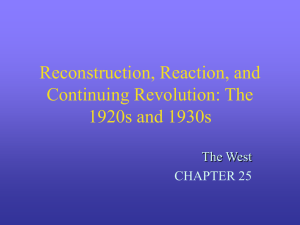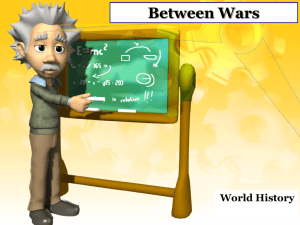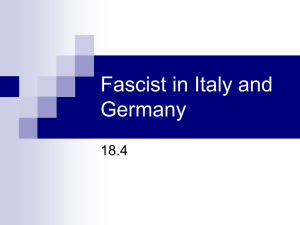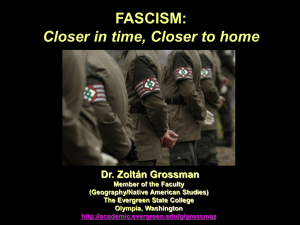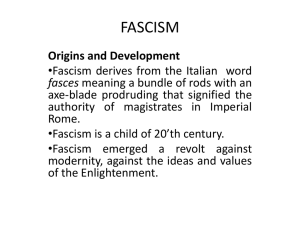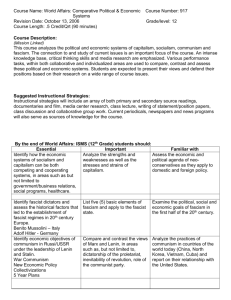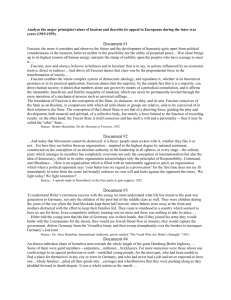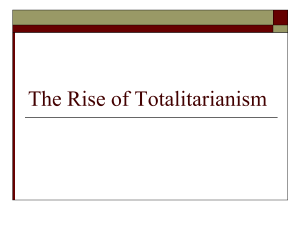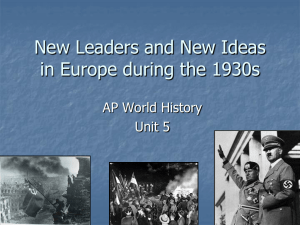Class Lesson Plan – University Sin Fronteras Course Title: Class
advertisement
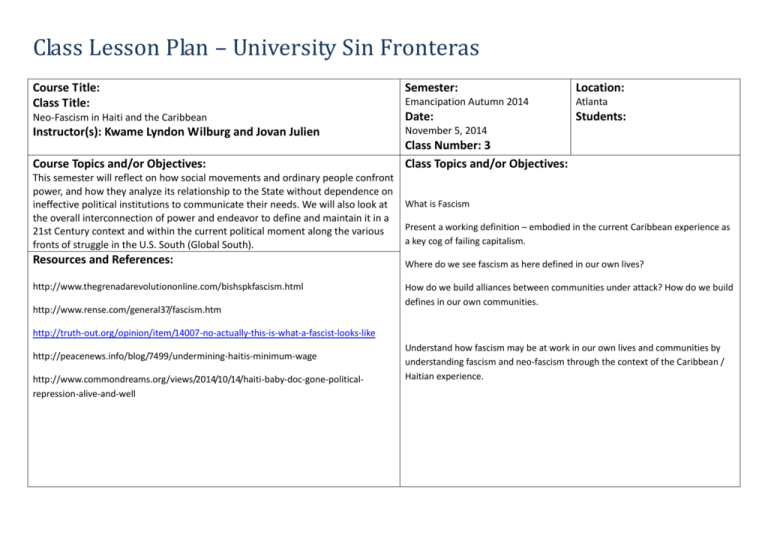
Class Lesson Plan – University Sin Fronteras Course Title: Class Title: Semester: Location: Emancipation Autumn 2014 Atlanta Neo-Fascism in Haiti and the Caribbean Date: Students: Instructor(s): Kwame Lyndon Wilburg and Jovan Julien November 5, 2014 Course Topics and/or Objectives: Class Number: 3 Class Topics and/or Objectives: This semester will reflect on how social movements and ordinary people confront power, and how they analyze its relationship to the State without dependence on ineffective political institutions to communicate their needs. We will also look at the overall interconnection of power and endeavor to define and maintain it in a 21st Century context and within the current political moment along the various fronts of struggle in the U.S. South (Global South). Resources and References: http://www.thegrenadarevolutiononline.com/bishspkfascism.html http://www.rense.com/general37/fascism.htm What is Fascism Present a working definition – embodied in the current Caribbean experience as a key cog of failing capitalism. Where do we see fascism as here defined in our own lives? How do we build alliances between communities under attack? How do we build defines in our own communities. http://truth-out.org/opinion/item/14007-no-actually-this-is-what-a-fascist-looks-like http://peacenews.info/blog/7499/undermining-haitis-minimum-wage http://www.commondreams.org/views/2014/10/14/haiti-baby-doc-gone-politicalrepression-alive-and-well Understand how fascism may be at work in our own lives and communities by understanding fascism and neo-fascism through the context of the Caribbean / Haitian experience. SEGMENT, TOPICS CONTENT RESOURCES, REFERENCES METHOD, TIME INTRO 15 min BODY 1 15 min 1. Introduction of presenters(5 min) 2. Introduction of Participants and what they hope to get out of the experience (10 min) - 30 seconds each Reinforce that participants should think about what they need to say and spend at most 30 seconds each in the interests of time. 3. Classical definition of fascism - (12 min) Real "F" word, historical fascism and its elements, neo fascism, corporate fascists state, Geography, instruments of oppression, 1. Powerful and Continuing Nationalism -. 2. Disdain for the Recognition of Human Rights 3. Identification of Enemies/Scapegoats as a Unifying Cause 4. Supremacy of the Military – 5. Rampant Sexism – 6. Controlled Mass Media – 7. Obsession with National Security 8. Religion and Government are Intertwined 9. Corporate Power is Protected 10. Labor Power is Suppressed 11. Disdain for Intellectuals and the Arts – 12. Obsession with Crime and Punishment – 13. Rampant Cronyism and Corruption 14. Fraudulent Elections – The Encyclopedia Britannica defines Fascism as being The name of a political attitude which puts the nation-state or the race, its power and growth in the centre of life and history . . . it disregards the individual and his rights, as well as humanity, in the exclusive interest of the nation. CORPORATE GOVERNMENT 1983 American Heritage Dictionary defined fascism as: "A system of government that exercises a dictatorship of the extreme right, typically through the merging of state and business leadership, together with belligerent nationalism." Fascists - “those who, paying lip service to democracy and the common welfare, in their insatiable greed for money and the power which money gives, do not hesitate surreptitiously to evade the laws designed to safeguard the public from monopolistic extortion.” “The American fascists are most easily recognized by their deliberate perversion of truth and fact. Their newspapers and propaganda carefully cultivate every fissure of disunity, every crack in the common front against fascism.” “They use every opportunity to impugn democracy,” “They demand free enterprise, but are the spokesmen for monopoly and vested interest. Their final objective toward which all their deceit is directed is to capture political power so that, using the power of the state and the power of the market simultaneously, they may keep the common man in eternal subjection.” Today in America, we are dangerously close to seeing Wallace’s fascistic, dystopic America come into fruition. We see the traces of it everywhere.– Henry Wallace Depending on the class we could ask the class to name out what they think our defining characteristics of fascists as far as they’ve known. Then have 14 readers read out these definitions if any are missing (write out the 14 on flash cards.) : http://www.rense.com/gen eral37/fascism.htm Dr. Lawrence Britt has examined the fascist regimes of Hitler (Germany), Mussolini (Italy), Franco (Spain), Suharto (Indonesia) and several Latin American regimes. Britt found 14 defining characteristics common to each: SEGMENT, TOPICS CONTENT METHOD, TIME 7 min Classical Fascism in the Caribbean Trujillo, the Duvalier’s, and 6 min Introduce the 6 Faces of Fascism – simplifies recognizing Political Face o Exemplified by total, absolutist rule. There is no real democracy within the ruling party. Second, opposition forces are either suppressed altogether or only allowed to function nominally. o Third, there is an effort to extend totalitarianism to all human relations. Parliament is a "talk-shop" totally under the control of the ruling clique, while the real work of running the country is done by a highly paid bureaucracy of civil servants. Legal and Constitutional Face where the law is blatantly used for the most repressive purposes. o Decisions and interpretations of the judiciary are aimed at ensuring that the wishes of the ruling clique are fully complied with . . . . Justice is totally one-sided. o "Justice", under such a system, is only for the ruling political and economic elites. Justice, in such a society, is not concerned with laws; indeed, administrative discretion is as important as law. The question of what is written in law books is hardly of any importance at all and is easily over-ridden by the administrative decisions and discretions of the people who control such a state - especially the maximum leader and his close cohorts. Military Face o where the standing army, navy (if any), police, auxiliary forces - Mongoose gangs, secretpolice etc. - are created for the sole purpose of ensuring through the use of violence, subjection to the will of the ruling clique and not for impartially upholding the law. o Official violence here takes the form of wrongful arrests, arbitrary imprisonments and RESOURCES, REFERENCES http://www.commondream s.org/views/2014/10/14/hai ti-baby-doc-gone-politicalrepression-alive-and-well SEGMENT, TOPICS CONTENT METHOD, TIME detentions, constant surveillance of progressive forces etc. Unofficial violence takes the form of threats, beatings (public and private), arson, assassinations, etc. o The function of this military apparatus is solely to enforce what they call "law and order", that is to say, law and order for the ruling political elite, law and order which is designed to ensure that the class interests that control the society continue to do so. An Economic Face where the economy is either nakedly capitalist and/or tied to imperialism or pseudo-socialist with some disengagement from imperialism, but in either event with the biggest capitalists openly or quietly - but objectively - supporting the ruling clique. o Here too there must be real efforts being made to control and divide the working class away from its real interests. With this economic face, the greatest confusion is possible; remember that both Fascism as developed in Italy and National Socialism or Nazi-ism (which later came to be regarded as just simply Fascism also) as developed by Hitler in Germany claimed to be socialist. Both these systems claimed to be nationalist, to be socialist, to be against big business and to be pro-labour. 15 min Fascism and Neo-Fascism experienced through the Caribbean context (HAITI) (12 min) Haiti and the Dominican Republic in the Baby Doc/ Papa Doc and Trujillo periods represent a more classical version of fascism (with other Central and South American Supporting Examples The Dominican Republic under Trujillo as well as Haiti before Aristide and to an extent Grenada under Eric Gairy arguably had achieved that status Although most Caribbean states have not becomes " Fascist" in the classic sense, Several have demonstrated notable aspects of fascism. The current Drug war – maintains 3. Identification of Enemies/Scapegoats as a Unifying Cause 4. Supremacy of the Military (funding and training by US military and DEA forces allows for the support of a military apparatus aligned to the dictates of the corporate government and empire vs the common people) RESOURCES, REFERENCES SEGMENT, TOPICS CONTENT METHOD, TIME Minimum wages are kept at a minimum and often can lead to the ouster of the government (the corporate argument is often that in a country with such numbers of unemployed raising the minimum wage will cause even less jobs to be offered. This is despite the fact that 9. Corporate Power is Protected – As mentioned in the article from "Truth-Out" and in our discourse we should point to the corporate influence if not control in most of the region --a softer aspect and give examples...eg Digicell, the way the Insurance and banking business has a big say in politics in the region. 10. Labor Power is Suppressed Despite repeatedly acknowledging the insufficiency of the minimum wage, as it had pervious done during the military junta that came to power in 1991 the US again intervened to prevent the raising of the minimum wage. In June 2009, a law that would raise the minimum wage to $5 a day was unanimously passed in the Haitian parliament, an increase which would still only pay Haitians less a day that the minimum hourly wage in America. “Given Haiti's endemic poverty and brittle democratic culture,” wrote Gary Younge on this development, “the fact that an elected parliament could pass a law that would earn such popular support was encouraging. The US thought otherwise.” Leak US diplomatic documents reveal that the deputy chief of mission at the US embassy, David Lindwall, insisted the proposed law “did not take economic reality into account” and referred to the planned increase in the minimum wage as being a populist measure aimed at appealing to “the unemployed and underpaid masses.” 14. Fraudulent Elections Though Duvalier has died, his influence remains strong in Haiti. It extends into the current government of Michel Martelly, which came to power in a flawed U.S.-backed election in which fewer than 20% of Haitians turned out to vote. After Duvalier's death, Martelly eulogized him as “a true son of Haiti.” 13. Rampant Cronyism and Corruption Duvalier's son Nicolas is an adviser to Martelly. Other Duvalier supporters include the Interior Minister and the Public Works Secretary of State. True to its orgins, the Martelly government is currently engaged in a series of attacks on Aristide which have raised concerns in Haiti and throughout the world. RESOURCES, REFERENCES SEGMENT, TOPICS CONTENT METHOD, TIME 25 min 5. ROUND ROBIN While neo-fascism does not always operate fully out in the open, what aspects of fascists control do you see at play in your communities or the world in general Given our detailing of neo-fascists forces and their efforts in the Caribbean we wanted to give the class a chance to contextualize neo-fascism in their own experience. Can you think of examples of neo-fascists efforts in your community/life (however selfdefined) Jamaican government decides to back Cuban campaign to provide concrete support to the front line of the South African alliance Kissenger essentially said you’re going to pay a price for this Imposition for hegemonic power Nationalization wave Jamaica , Guyanna came under a lot of fire Round Robin Wrap and Extension 10 min 6. Examples of how Fascism has been fought in the Caribbean and south/central America Both successes and learning points )Theatres of struggle As far as the responses I think we should point out the importance of solidarity with the workers in the region, awareness of the Abuses, developing and maintaining strong people to people relations. Cuba – Direct Armed Action, Takeover of the State Apparatus Venezuela – Concerted Elections victory and strong action by left political organizations CLOSING ACTIONS (20 min) REFLECTION QUESTION (10 min) 7. Group projects picking one element of fascism we identified in the last round robin and how it can be fought (20 min) 9. Reflection papers(10 min) Haiti – Popular uprising with elections supported by the US. Popular democracy undermined when it went against the interests of the unipolar dominant force US (Echoed in the fall of Egypt) 8. Report Back (10 min) How do you see fascism at play in your community and how can it be combatted? RESOURCES, REFERENCES 14 defining characteristics common to each (Classical Fascism):1 1. Powerful and Continuing Nationalism - Fascist regimes tend to make constant use of patriotic mottos, slogans, symbols, songs, and other paraphernalia. Flags are seen everywhere, as are flag symbols on clothing and in public displays. 2. Disdain for the Recognition of Human Rights - Because of fear of enemies and the need for security, the people in fascist regimes are persuaded that human rights can be ignored in certain cases because of "need." The people tend to look the other way or even approve of torture, summary executions, assassinations, long incarcerations of prisoners, etc. 3. Identification of Enemies/Scapegoats as a Unifying Cause - The people are rallied into a unifying patriotic frenzy over the need to eliminate a perceived common threat or foe: racial, ethnic or religious minorities; liberals; communists; socialists, terrorists, etc. 4. Supremacy of the Military - Even when there are widespread domestic problems, the military is given a disproportionate amount of government funding, and the domestic agenda is neglected. Soldiers and military service are glamorized. 5. Rampant Sexism - The governments of fascist nations tend to be almost exclusively male-dominated. Under fascist regimes, traditional gender roles are made more rigid. Divorce, abortion and homosexuality are suppressed and the state is represented as the ultimate guardian of the family institution. 6. Controlled Mass Media - Sometimes to media is directly controlled by the government, but in other cases, the media is indirectly controlled by government regulation, or sympathetic media spokespeople and executives. Censorship, especially in war time, is very common. 7. Obsession with National Security - Fear is used as a motivational tool by the government over the masses. 8. Religion and Government are intertwined - Governments in fascist nations tend to use the most common religion in the nation as a tool to manipulate public opinion. Religious rhetoric and terminology is common from government leaders, even when the major tenets of the religion are diametrically opposed To the government's policies or actions. 9. Corporate Power is protected - The industrial and business aristocracy of a fascist nation often are the ones who put the government leaders into power, creating a mutually beneficial business/government relationship and power elite. 10. Labour Power is suppressed - Because the organizing power of labour is the only real threat to a fascist government, labour unions are either eliminated entirely, or are severely suppressed. 11. Disdain for Intellectuals and the Arts - Fascist nations tend to promote and tolerate open hostility to higher education, and academia. It is not uncommon for professors and other academics to be censored or even arrested. Free expression in the arts and letters is openly attacked. 12. Obsession with Crime and Punishment - Under fascist regimes, the police are given almost limitless power to enforce laws. The people are often willing to overlook police abuses and even forego civil liberties in the name of patriotism. There is often a national police force with virtually unlimited power in fascist nations. 13. Rampant Cronyism and Corruption - Fascist regimes almost always are governed by groups of friends and associates who appoint each other to government positions and use governmental power and authority to protect their friends from accountability. It is not uncommon in fascist regimes for national resources and even treasures to be appropriated or even outright stolen by government leaders. 14. Fraudulent Elections - Sometimes elections in fascist nations are a complete sham. Other times elections are manipulated by smear campaigns against or even assassination of opposition candidates, use of legislation to control voting numbers or political district boundaries, and manipulation of the media. Fascist nations also typically use their judiciaries to manipulate or control elections. 1 Dr. Lawrence Britt has examined the fascist regimes of Hitler (Germany), Mussolini (Italy), Franco (Spain), Suharto (Indonesia) and several Latin American regimes. Britt found 14 defining characteristics common to each: 6 Faces (Neo-Fascism) 2 A Political Face exemplified by total, absolutist rule. This is further characterised by four main qualities. First, within the ruling clique a hierarchical structure which ends with a total mystification and projection of and decision-making by the maximum leader/ruling bureaucracy. There is no real democracy within the ruling party. Second, opposition forces are either suppressed altogether or only allowed to function nominally. Third, there is an effort to extend totalitarianism to all human relations. Fourth, Parliament is a "talk-shop" totally under the control of the ruling clique, while the real work of running the country is done by a highly paid bureaucracy of civil servants. A Legal and Constitutional Face where the law is blatantly used for the most repressive purposes. Here, there is no respect for the rule of law, and laws passed are devised mainly to quell progressive activity and to provide a facade of legality for police repression. All sorts of repressive laws are passed, laws designed to cushion and stifle the rising working class revolution, to keep the working class divided and confused, laws designed to entrench and ensure the place of big business in the society. In other words, the main concern of laws would not be for the purpose of ensuring maximum happiness for all citizens but would be primarily for the purpose of ensuring that the profits, particularly the profits of the international bourgeoisie, are kept intact. And therefore, the areas in which primary concentration is given are precisely those areas which support and complement the legal apparatus. I refer particularly to the police, the military and the para-military. A Judicial Face where open or barely disguised attempts are made to totally control and nakedly compromise the independence of the magistracy and the judiciary. Decisions and interpretations of the judiciary are aimed at ensuring that the wishes of the ruling clique are fully complied with . . . . Justice is totally one-sided. "Justice", under such a system, is only for the ruling political and economic elites. Justice, in such a society, is not concerned with laws; indeed, administrative discretion is as important as law. The question of what is written in law books is hardly of any importance at all and is easily over-ridden by the administrative decisions and discretions of the people who control such a state - especially the maximum leader and his close cohorts. A Military Face where the standing army, navy (if any), police, auxiliary forces - Mongoose gangs, secret-police etc. - are created for the sole purpose of ensuring through the use of violence, subjection to the will of the ruling clique and not for impartially upholding the law. Official violence here takes the form of wrongful arrests, arbitrary imprisonments and detentions, constant surveillance of progressive forces etc. Unofficial violence takes the form of threats, beatings (public and private), arson, assassinations, etc. The function of this military apparatus is solely to enforce what they call "law and order", that is to say, law and order for the ruling political elite, law and order which is designed to ensure that the class interests that control the society continue to do so. This "law and order" is not concerned in the slightest with going into a board meeting of Texaco or Amoco to discover the ways in which account books are being manipulated and to arrest these people but instead looks to harassing individuals on the block or harassing oppressed workers when they strike, or breaking up peaceful demonstrations and marches. This is the sort of law and order which applies in such a state. An Economic Face where the economy is either nakedly capitalist and/or tied to imperialism or pseudo-socialist with some disengagement from imperialism, but in either event with the biggest capitalists openly or quietly - but objectively - supporting the ruling clique. Here too there must be real efforts being made to control and divide the working class away from its real interests. With this economic face, the greatest confusion is possible; remember that both Fascism as developed in Italy and National Socialism or Nazi-ism (which later came to be regarded as just simply Fascism also) as developed by Hitler in Germany claimed to be socialist. Both these systems claimed to be nationalist, to be socialist, and to be against big business and to be pro-labou 2 Bishop Speech - Fascism—a Caribbean Reality?Speech on [October 17th] during the Oilfields Workers Trade Union Leadership Seminar, 12th-19th Oct 1975
